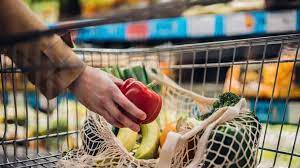
Infectious Covid virus can stay on some groceries for days
They picked foods often sold loose at grocery, deli or bakery counters, such as apples, peppers, cheese, ham, olives, crusty bread and croissants.
The packaging tested included drink bottles, cartons and cans.
Advertisement
The amount of virus they applied was designed to simulate how much might land on food if someone who was infected coughed or sneezed near it, for example, because Covid is spread by respiratory droplets.
Breathing in infected droplets, rather than touching infected surfaces, is still the main way people catch Covid.
Anthony Wilson, microbiological risk assessment team leader at the FSA, said: "In the early stages of the pandemic, we didn't know much about how the virus would survive on different food surfaces and packaging, so the risk assessment was based on a worst-case assumption.
"This research gives us additional insight into the stability of coronavirus on the surfaces of a variety of foods and confirms that assumptions we made in the early stages of the pandemic were appropriate, and that the probability that you can catch Covid via food is very low."
Food tests
The team examined a range of temperatures and humidity levels to mimic typical storage conditions, measuring the rate of inactivation of the virus, and found:
Fresh fruit and veg
The virus appears to last longer on produce with uneven surfaces - broccoli and raspberries - than on smooth skinned ones such as apples (although some chilled fresh peppers had detectable virus a week later).
Apples contain natural chemicals in their skin that may start to break down the Covid virus within minutes or hours, the scientists say.
Baked goods
Pastries such as pain au chocolat appeared to have little virus after a few hours - perhaps because they are coated in a fine layer of egg wash during baking, say the FSA scientists. Eggs contain arachidonic acid which might have an antiviral effect.
Deli items
Cheese and cold meat, with a high protein and fat content, appear to allow the virus to survive for days - possibly a week.
Drinks and ready meal containers
Covid can survive for up to a week on plastic surfaces. For cartons, it could be several days. For aluminium cans, it is probably only hours, say the researchers.
BBC



